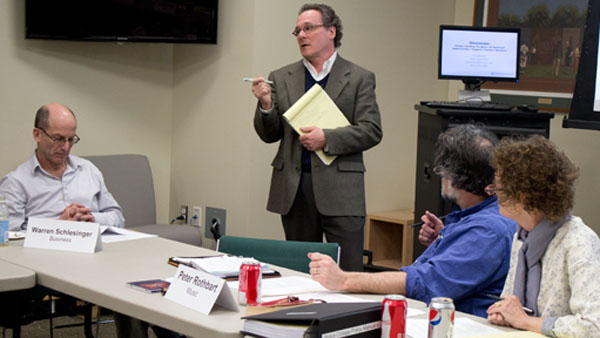The Ithaca College Faculty Council focused on matters that directly impact students, such as expanding online education opportunities, at their meeting Tuesday.
Members also discussed the budget for the 2013-14 academic year and town meetings for faculty to address their opinions on topics affecting staff and faculty.
Marisa Kelly, provost and vice president of academic affairs, gave an update about the online workflow project, which will reduce the need for paper for forms such as sabbaticals, overrides and admissions applications. She said the first form moving from paper to online will be the course registration override form, which will be beta tested in the Roy H. Park School of Communications in April. Kelly said she hopes the system will be fully implemented in the fall.
After an executive session with President Tom Rochon and Kelly and a presentation from Rob Gearhart, assistant provost of online learning and extended studies, Faculty Council discSkussed the policies of study away and online education. Gearhart said he wants to make online programs more available to students and make sure availability of online classes is not a deciding factor in whether students study away.
“Our thinking was to try to align with the IC 20/20 initiative to make it possible for more students to study away,” Gearhart said.
Lisabeth Chabot, college librarian, said expanding the variety of online courses offered to students will help students studying away from the college have a more well-rounded course load. Chabot said online courses would also help students meet academic requirements remotely.
“We’re talking about a student being able to take a more complete credit load rather than relying so much on the on-site courses that might be for example in London or wherever, that we might expand the course offerings that would be available to students … in remote sites or students who are away from campus,” Chabot said.
During the meeting, Gearhart said 4 to 5 percent of undergraduates take summer course credits. He said a survey showed that high costs were one of the reasons this number is low. Gearhart said this is something that is being taken into consideration as the program is being assessed.
Members of the Faculty Council voiced their concerns about online education, especially related to their respective departments. For example, Mark Andrew Hall, assistant professor of modern languages and literature, said online courses should not be created to offer opportunities to take the same course a student has been shut out of.
“You’ve gotta be careful about not equating an online experience and a classroom experience,” Hall said.
Gearhart said he is working to gather more student input by attending meetings of student organizations like Student Government Association. Skott Freedman, assistant professor of Speech Language Pathology and Audiology suggested Gearhart send out a survey to all students to gauge a wider range of opinions.
“We’ve also talked about looking at too, with the registrar, looking at courses that are oversubscribed and that students often get closed out of, and maybe those are courses where having an online section would allow more students to graduate on time, for example, and then possibly [contribute] to retention,” Chabot said.







